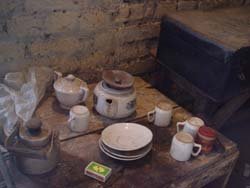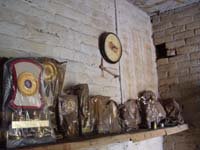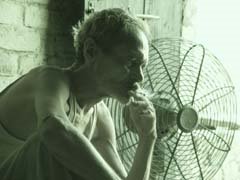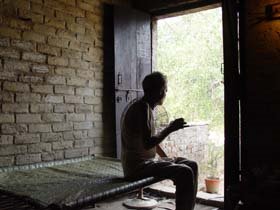I am working on a mini Graphic novel, titled - Byte Soldiers: The life and times of a Metro TV Reporter, for Sarai (CSDS). You can read some of my postings here:
The BJP Correspondent
The Sissy Proletariat
His shoulders and Dodee
The Ninnies of Television
Skull and Cotton Candy
Friday, July 28, 2006
Thursday, July 27, 2006
Your almond eyes

Tumhari aankhon ka aakash
Saral aankhon ka neela aakash
(The sky of your eyes
The blue sky of
Your simple eyes)
You were too young to have inspired the above lines of a Hindi poet, who wrote it decades ago. But if you ask me, Priyadarshani, I would like to compare your eyes to the raw, green spring almonds of Kashmir. I have been told that you were an award-winning singer, who performed in faraway nations like Russia. Tell me, did they look at you, the Russians, and utter: Mera joota hai Japani, ye patloon Hindustani – did they?
I imagine you walking on the road near your South Delhi house, humming a tune gently. Or smiling shyly in affirmation on being asked: Are you a Kashmiri? Yes you were and to be recognised on the streets as one, you did not need the symbolic Dejharu.
Long before you turned 26, your parents, like almost all Kashmiri Pandit families, must have begun to amass many small and big things to be sent along with you at the time of your marriage. Kashmiri shawls, carpets, silverware. They must have spoken in hushed tones about this or that boy who they would have seen during marriage ceremonies of friends and relatives.
These days, I visit your area quite often. I am just trying to help my friend Ajay in his next film. He lives just behind the road that Santosh Kumar would have taken to approach your house, rape you and then kill you by strangulating you with a telephone cable.
You are no more than a faded picture in this mortal world. Your killer is a practising lawyer. But you know, Priya, I have just been back after listening to a man’s story who witnessed the 1947 Indo-Pak partition as a five-year old kid. There is no heaven or hell. Every account is settled here on Earth. His will be too. But don’t you know that already?
This evening, a friend sang Shiv Kumar Batalvi’s song:
Ik kudi
Jidda naam mohabbat
Saad muradi
Soni fabbat
Gumm hai, gumm hai
Gumm hai
(A girl
Named love
Simple
Lovely
She is lost
Lost she is)
Where do I find you? Hey don’t pinch my shoulder.
Friday, July 14, 2006
If I turn blind tonight

Poring over a yellow carton, you entered into my stream of consciousness like a ray. Your eyes were fixed upon your fingers trying to open that carton. But somehow I felt that you had included me in the array of your sight. As if to confirm my view, a smile played on your lips like a flute. It seemed to play a song, the words of which could have been: Hey, do not hide there, for I know you are here...
We never met, we never spoke, but we acted as confession boxes for each other. I could share those really lunatic thoughts with you. So could you and I nearly transformed into a father, a friendly one, while seeking answers to questions you almost asked.
I discovered very early, within you, the same wheel of restlesness which I had driven with the wooden stick of my being when I was of your age and younger. Half hidden behind the red, yellow and blue fibres of Dharamshala blankets, you asked me riddles the answers to which I sought in your eyes and ultimately found them in your smile. How I wish we could lay together, our heads supported by our elbows and, while you shared the secrets of your friends with me, I would remove your yellow hair band and play with it!
We could also wear those masks - I choose the red one with demon's face - and dance stupidly in the wilderness, pretending to frighten each other. We could also talk endlessly with that old Tibetan woman. I could also tell you that the paper machie boxes made in Kashmir are the best.
I am a dreamer, excuse me, and I dream about the most stupid and flimsy and childish dreams ever known to mankind. Consider this - You have put my picture up on your blog and then your statement has changed to this: All photographs published on this website and the man featuring in the topmost photograph are the property of PPK.
And yes, PPK, if I were to turn blind tonight, you would remain dear to me.
(Pic by PPK, taken at Dharamshala)
Wednesday, July 05, 2006
The shades of his evening
When
Many suns will die
Then
Your era will arrive
Isn’t it?
Many suns have died since these lines were written but their time has still not come. So more lines are being created, more suns are being done to death, in that brick dwelling. Inside the four brick walls, the sun that survived, is wreaking havoc with its heat. The room is hot like a furnace. In the middle of the room, over a string cot, lies Lal Singh Dil, writing the last paragraph of his 78-page poem.

On the cheap register that bears the lashes of his personal history, Dil has noted down the day when he began writing the poem, two years ago. In front of his cot lies another cot, like a berated lover. Few dirty cups share a table with few saucers and two kettles; one made of cheap bone china and the other of aluminium. An old iron trunk plays foootsie with rust in one corner. Numerous mementoes weigh heavily on a cement slab. Their plastic covers have never been lifted. The floor near Dil is littered with Beedis and burnt and unburnt matchsticks.
Jo ladna nahi jaande
Jo ladna nahi chohnde
Wo gulam bana liye jaande ne
(Those who do not know how to fight
Those who do not want to fight
They are turned into slaves)

Lal Singh Dil is sixty-three now. He wrote these lines in 1967 when the thunder spring of Naxalbari reverberated in faraway Punjab. For the first time in his life, he felt as if his life had a mission. There was no point in remaining only a poet now. So Dil picked up a gun and joined the movement.
In his recent unpublished poem, Dil describes a dream where he sees his mother washing his clothes. He tries to hold her and she breaks away, prompting him to write:
Mein kis da putt han?
(Whose son am I?)
It is a manifestation of Dil’s longing for love, which he did not receive from anyone except his mother. Born in the chamar (tanner) community in Samrala town of Punjab, Dil was the first member of his family to finish school. His mother sold off her ear rings to make sure that Dil went right up to college.
Those who know Dil since college days say that he was very handsome and because of this and his poetry, many girls fell for him. There was one girl who wore her hair in plaits and lived in a neighbouring village. She was from an upper caste family. Dil’s friend lived in the same village and so Dil would see that girl often and developed a liking for her. But she died of cerebral haemorrhage. Later Dil would find another girl who looked like that girl, wearing her hair in the same fashion. One day he was invited to that girl’s house where he was offered tea in a steel tumbler. Afterwards, the girl’s mother picked the tumbler with a pair of tongs and threw it in fire to purify it. Dil writes in his autobiography Dastaan (Story) that he can still hear the clank of that tumbler thrown in the fire.

Dil began to write poetry during his college days. One of his early poems was published by Preetlarhi, a leading literary journal of Punjab in those times. He was working as a daily wage labourer when the peasant uprising in Naxalbari spread like wildfire. That was the time when Dil wrote a poem called ‘The shades of Evening’.
After remaining underground for four years, Dil was arrested by the Police. In the lock-up, the upper-caste Police officer slapped Dil hard and shouted: Ab chamar kranti layenge is desh mein? (Would the lower caste bring revolution in this country now?)
For nine months, Dil would face extreme physical torture. He would be subjected to more torture than his fellow comrades because of his caste and because of his poetry.
Soon after his release from the prison, Dil had to go into hiding once again. Only this time the period of hiding was much longer. He fled from his hometown to a village near Lucknow in Uttar Pradesh, where he worked as labourer in mango orchards. He made a comeback in mid 80’s, after a gap of fifteen years.

By that time, the memory of Lal Singh Dil had faded away from people’s memory. He was an icon in 70’s, Samrala’s own Che Guevara. Fifteen years later, he had to open up a tea-stall to make his ends meet. Even that did not last for long. But what did, and still is, is Lal Singh Dil’s ink.
Dil happens to be the contemporary of radical poets like Avtar Singh Pash and Santram Udasi. In ‘The shades of Evening’, based on his experiences during the Naxalbari movement, Dil writes:
The shades of evening
Are old once again
The pavements
Head for settlements
A lake walks
From an office
Thrown out of work
A lake is sucking
The thirst of water
Throwing off all wages
Someone is leaving
Someone comes wiping
On his dhoti
The blood of weak animals
On his goad
The shades of evening
Are old once again
Loaded with rebuke
The long caravan moves on
Along with the
Lengthening shadows of evening
In his one-room hermitage, Lal Singh Dil, the biggest name in Punjabi free verse poetry, spends his last days in penury. He told someone recently that he does not expect anything from anyone.
In the same 78-page unpublished poem, Dil writes:
I do not want to write about my personal sorrows.
Lal Singh Dil’s wounds are too many to heal. And something has to be done with his sorrows also. The shades of evening may have to turn like old once again.
***
This journey became possible because of my friend, filmamker Ajay Bharadwaj. His recent film Kitte Mil Ve Mahi features Lal Singh Dil as radical poet.
Many suns will die
Then
Your era will arrive
Isn’t it?
Many suns have died since these lines were written but their time has still not come. So more lines are being created, more suns are being done to death, in that brick dwelling. Inside the four brick walls, the sun that survived, is wreaking havoc with its heat. The room is hot like a furnace. In the middle of the room, over a string cot, lies Lal Singh Dil, writing the last paragraph of his 78-page poem.

On the cheap register that bears the lashes of his personal history, Dil has noted down the day when he began writing the poem, two years ago. In front of his cot lies another cot, like a berated lover. Few dirty cups share a table with few saucers and two kettles; one made of cheap bone china and the other of aluminium. An old iron trunk plays foootsie with rust in one corner. Numerous mementoes weigh heavily on a cement slab. Their plastic covers have never been lifted. The floor near Dil is littered with Beedis and burnt and unburnt matchsticks.
Jo ladna nahi jaande
Jo ladna nahi chohnde
Wo gulam bana liye jaande ne
(Those who do not know how to fight
Those who do not want to fight
They are turned into slaves)

Lal Singh Dil is sixty-three now. He wrote these lines in 1967 when the thunder spring of Naxalbari reverberated in faraway Punjab. For the first time in his life, he felt as if his life had a mission. There was no point in remaining only a poet now. So Dil picked up a gun and joined the movement.
In his recent unpublished poem, Dil describes a dream where he sees his mother washing his clothes. He tries to hold her and she breaks away, prompting him to write:
Mein kis da putt han?
(Whose son am I?)
It is a manifestation of Dil’s longing for love, which he did not receive from anyone except his mother. Born in the chamar (tanner) community in Samrala town of Punjab, Dil was the first member of his family to finish school. His mother sold off her ear rings to make sure that Dil went right up to college.
Those who know Dil since college days say that he was very handsome and because of this and his poetry, many girls fell for him. There was one girl who wore her hair in plaits and lived in a neighbouring village. She was from an upper caste family. Dil’s friend lived in the same village and so Dil would see that girl often and developed a liking for her. But she died of cerebral haemorrhage. Later Dil would find another girl who looked like that girl, wearing her hair in the same fashion. One day he was invited to that girl’s house where he was offered tea in a steel tumbler. Afterwards, the girl’s mother picked the tumbler with a pair of tongs and threw it in fire to purify it. Dil writes in his autobiography Dastaan (Story) that he can still hear the clank of that tumbler thrown in the fire.

Dil began to write poetry during his college days. One of his early poems was published by Preetlarhi, a leading literary journal of Punjab in those times. He was working as a daily wage labourer when the peasant uprising in Naxalbari spread like wildfire. That was the time when Dil wrote a poem called ‘The shades of Evening’.
After remaining underground for four years, Dil was arrested by the Police. In the lock-up, the upper-caste Police officer slapped Dil hard and shouted: Ab chamar kranti layenge is desh mein? (Would the lower caste bring revolution in this country now?)
For nine months, Dil would face extreme physical torture. He would be subjected to more torture than his fellow comrades because of his caste and because of his poetry.
Soon after his release from the prison, Dil had to go into hiding once again. Only this time the period of hiding was much longer. He fled from his hometown to a village near Lucknow in Uttar Pradesh, where he worked as labourer in mango orchards. He made a comeback in mid 80’s, after a gap of fifteen years.

By that time, the memory of Lal Singh Dil had faded away from people’s memory. He was an icon in 70’s, Samrala’s own Che Guevara. Fifteen years later, he had to open up a tea-stall to make his ends meet. Even that did not last for long. But what did, and still is, is Lal Singh Dil’s ink.
Dil happens to be the contemporary of radical poets like Avtar Singh Pash and Santram Udasi. In ‘The shades of Evening’, based on his experiences during the Naxalbari movement, Dil writes:
The shades of evening
Are old once again
The pavements
Head for settlements
A lake walks
From an office
Thrown out of work
A lake is sucking
The thirst of water
Throwing off all wages
Someone is leaving
Someone comes wiping
On his dhoti
The blood of weak animals
On his goad
The shades of evening
Are old once again
Loaded with rebuke
The long caravan moves on
Along with the
Lengthening shadows of evening
In his one-room hermitage, Lal Singh Dil, the biggest name in Punjabi free verse poetry, spends his last days in penury. He told someone recently that he does not expect anything from anyone.
In the same 78-page unpublished poem, Dil writes:
I do not want to write about my personal sorrows.
Lal Singh Dil’s wounds are too many to heal. And something has to be done with his sorrows also. The shades of evening may have to turn like old once again.
***
This journey became possible because of my friend, filmamker Ajay Bharadwaj. His recent film Kitte Mil Ve Mahi features Lal Singh Dil as radical poet.
Subscribe to:
Comments (Atom)




